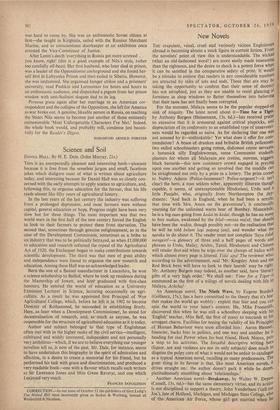Science and Soil
DANIEL HALL. By H. E. Dale. (John Murray, 21s.)
Tins is an unexpectedly pleasant and interesting book—pleasant because it is free from the senseless jargon and small, facetious jokes which disfigure most of what is written about agriculture today, and interesting because Sir Daniel Hall was so closely con- cerned with the early attempts to apply science to agriculture, and, following this, to organise education for the farmer, that his life reads almost like fifty years of agricultural history.
In the late years of the last century the industry was suffering from a prolonged depression, and most farmers were without capital, general education or hope. Progress might have been very slow but for three things. The most important was that two world wars in the first half of the new century forced the English to look to their farmers to protect them from starvation. The second that, sometimes through genuine enlightenment, as in the case of the Development Commission, sometimes as a bribe to an industry that was to be politically betrayed, as when £1,000,000 to education and research softened the repeal of the Agricultural Act of 1920, the Exchequer began to make contributions towards scientific development. The third was that men of great ability and independence were found to organise the new research and education. Among these Hall was an acknowledged leader.
Born the son of a flannel manufacturer in Lancashire, he won a science scholarship to Balliol, where he took up residence during the Mastership of Jowett, and later graduated with first-class honours. He entered the world of education as a University Extension Lecturer in Science, lecturing occasionally on agri- culture. Asa result he was appointed first Principal of Wye Agricultural College, which, before he left it, in 1902 to become Director of Rothamsted, he succeeded in establishing firmly. Here, as later when a Development Commissioner, he stood for decentralisation of research, and, as' much as anyone, he was responsible for the structure of agricultural education as it is today.
Author and subject belonged to that type of Englishman often met with in the higher ranks of the civil service—intelligent, cultivated and widely interested, independent and not personally very ambitious—which, if we are to believe everything our younger novelists tell us, is now of the past. Mr. Dale, for instance, seems to have undertaken this biography in the spirit of admiration and affection, in a desire to create a memorial for his friend, but he performed his task with grace and discrimination, and produced a very readable book--one with a flavour which recalls such writers as Sir Lawrence Jones and Miss Gwen Raverat, and one which I enjoyed very much.
FRANCES DONALDSON CORRECTION.—In our issue of October 12 the publishers of Gert Ledig's The. Naked Hill were incorrectly given as Seeker & Warburg, instead of Weidenfeld & Nicolson.










































 Previous page
Previous page